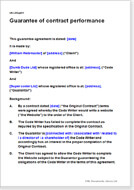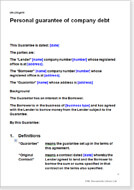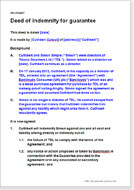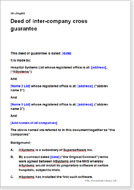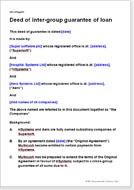Documents to provide additional security to an existing contract
The subject matter of these documents is of a legal-technical nature. For that reason, none of them contain the wide range of options you will find in most Net Lawman documents. They are best used by insertion of the facts only, as we guide in the extensive drafting notes provided with each document.
They can be used where one or more of the parties are outside of the UK.
Sign your agreement as a deed, or as an agreement under hand. Our guidance notes explain how to do both.
The difference between a guarantee and an indemnity
A guarantee is a promise by a third party to carry out the obligations of one of the parties to the contract should that party fail to do so.
Guarantors often are brought into a contract to give additional security on rent or loan payments, but a guarantor could be used for the performance of any terms.
For example, because the shareholders in a limited company have limited liability by definition, anyone contracting with a new company may well ask for the personal assurance in formal writing of a director.
An indemnity is similar to insurance. The indemnifier has an obligation only if a specified event actually happens.
An indemnifier compensates the party for lack of performance. For example, an inventor might say: “I will grant you a licence to make my product but if you allow anyone else to copy the design, you must indemnify me against both the revenue I could have earned by granting a licence and also the cost of going to court to claim.”
Agreeing to be a guarantor
If you agree to be a guarantor, you should always make absolutely sure that you will be able to perform the action you have guaranteed. If the guarantee is simply that rent payments are made, then of course it is simply a matter of calculating whether you would be able to pay.
However, be careful of guaranteeing something that might be challenging for anyone, such as to bring a new technology to market; or wide obligations, such as on all terms of a lease. If you are called upon to stand in for the original party, you may find yourself unable to fulfil your obligations, or you may find that you are asked to fulfil obligations you did not originally intend to cover.
We advise against being a guarantor unless you are sure you could perform the contract, and the contract is very specific.
The law relating to these documents
These documents are based on the common law of contract.
Section 4 of the Statute of Frauds Act 1677 requires that only a guarantee in writing can be enforced.
There is no such requirement in the case of an indemnity, although of course written agreement is always best as a matter of practice and for proof.
Enforcing the guarantee or indemnity
At its most simple, the damaged party will normally have to make a formal demand of the original performer before he can ask the guarantor to step in. Depending on the subject matter of the guarantee, he may even have to issue a claim to prove that the original performer cannot perform.
An indemnity however, allows the person indemnified to approach the indemnifier as soon as there is a loss.
However, despite possibly being less easy to enforce, a guarantee is usually a more powerful psychological incentive for the original performance of the contract. People dislike having to lose face to their guarantor.
Similarly, whether you have an indemnity or a guarantee, it will always be more effective against an individual than a company. By and large, people would rather avoid personal bankruptcy than avoid letting their company go down.


